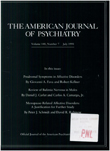Interhemispheric transfer deficit and alexithymia
Abstract
The hypothesis that alexithymia reflects a functional disconnection between the two cerebral hemispheres was examined in 25 male combat veterans with posttraumatic stress disorder (PTSD). Multiple regression analysis revealed that the efficiency of interhemispheric communication, evaluated with a tactile finger localization task, was a significant predictor of the degree of alexithymia, as measured by the Toronto Alexithymia Scale, independent of PTSD severity and IQ. The PTSD subjects without alexithymia did not differ on the finger localization task from 10 male control subjects without alexithymia. These data suggest that at least some forms of alexithymia may be mediated by an interhemispheric communication deficit.
Access content
To read the fulltext, please use one of the options below to sign in or purchase access.- Personal login
- Institutional Login
- Sign in via OpenAthens
- Register for access
-
Please login/register if you wish to pair your device and check access availability.
Not a subscriber?
PsychiatryOnline subscription options offer access to the DSM-5 library, books, journals, CME, and patient resources. This all-in-one virtual library provides psychiatrists and mental health professionals with key resources for diagnosis, treatment, research, and professional development.
Need more help? PsychiatryOnline Customer Service may be reached by emailing [email protected] or by calling 800-368-5777 (in the U.S.) or 703-907-7322 (outside the U.S.).



